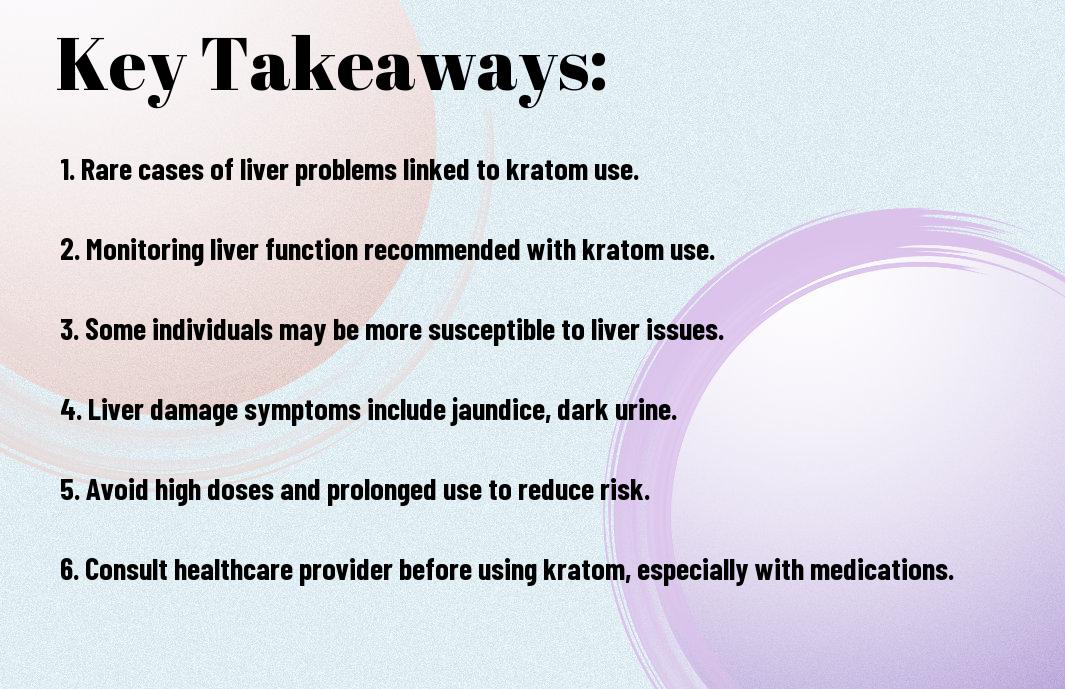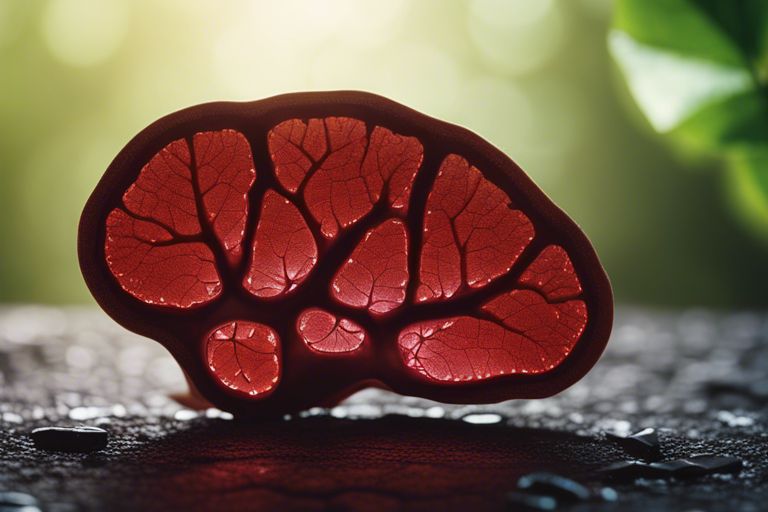Many have questioned the potential risks associated with kratom consumption, particularly its impact on the liver. This blog post explores into the scientific evidence surrounding kratom’s effects on liver health, exploring if and how this popular botanical substance could pose serious concerns for one’s liver function. Stay informed to make the healthiest choices when considering kratom for your well-being.
Key Takeaways:
- Kratom and Liver Problems: While rare, there have been reported cases of liver damage associated with kratom use.
- Potential Liver Toxicity: Some studies suggest that certain individuals may be more susceptible to liver issues from kratom due to metabolic factors.
- Caution and Monitoring: It is important for individuals using kratom to be aware of the potential risks to the liver and to monitor their health closely while using this herbal supplement.

What is Kratom?
While many people have heard of kratom, not everyone is familiar with this botanical substance. Kratom, scientifically known as Mitragyna speciosa, is a tropical tree native to Southeast Asia. Its leaves have been traditionally used for their medicinal properties by people in countries like Thailand, Malaysia, and Indonesia.
Origins and History
An exploration of kratom’s origins and history reveals its longstanding use in traditional practices. Indigenous communities in Southeast Asia have utilized kratom for centuries, often consuming its leaves by chewing or brewing them into teas. The plant has been valued for its stimulant effects, helping to combat fatigue and increase energy levels, as well as for its analgesic properties, which can alleviate pain.
Chemical Composition
With over 40 compounds identified in kratom leaves, the plant’s chemical composition is complex. The two most prominent active alkaloids found in kratom are mitragynine and 7-hydroxymitragynine. These compounds interact with opioid receptors in the brain, producing effects that can vary from stimulant-like to sedative, depending on the dosage and strain of kratom.
Understanding the chemical composition of kratom is crucial in examining its potential effects on the body, including positive outcomes such as pain relief and increased focus, as well as potentially dangerous consequences like addiction and respiratory depression. Researchers continue to study kratom to gain a better understanding of how its various compounds interact with the body.
How Does Kratom Affect the Liver?
Clearly, understanding how kratom affects the liver is crucial in determining its potential for causing liver problems. According to a study on kratom-induced acute liver injury, researchers found that metabolic processing plays a significant role in how kratom affects the liver.
Metabolism and Processing
To explore deeper into how kratom impacts the liver, it’s vital to look at its metabolism and processing within the body. Kratom undergoes extensive metabolism primarily in the liver, where it is broken down by enzymes. This process can lead to the formation of metabolites that may potentially cause liver toxicity.
Potential Toxicity
One concerning aspect of kratom’s effect on the liver is its potential for toxicity. Studies have shown that chronic kratom use can lead to liver damage, with cases of hepatitis and liver failure reported. The liver is responsible for metabolizing kratom compounds, and excessive or prolonged exposure to these substances can overwhelm the liver’s detoxification pathways, leading to toxicity.
Toxicity
Reported Cases of Liver Damage
Anecdotal Evidence
Evidence from anecdotal reports suggests that some individuals may experience liver problems after consuming kratom. Users have reported symptoms such as jaundice, itching, dark urine, and abdominal pain, which are all signs of potential liver damage. While these reports cannot definitively prove that kratom causes liver damage, they raise concerns about the safety of long-term kratom use.
Scientific Studies
An analysis of scientific studies on kratom and liver damage reveals conflicting results. Some studies have suggested a potential link between kratom use and liver toxicity, while others have not found conclusive evidence of this association. It is important to note that many of these studies have limitations, such as small sample sizes and variability in kratom preparations, making it challenging to draw definitive conclusions.
Another study conducted on mice showed that high doses of kratom extract led to liver injury. The researchers observed liver damage markers in the blood of the mice, indicating potential hepatotoxicity associated with kratom use. These findings underscore the need for further research to better understand the potential risks of kratom on liver health.
Based on the available evidence, individuals should be cautious when using kratom and monitor their liver function regularly, especially if using it for an extended period. Consulting a healthcare professional before starting kratom and discussing any potential risks is advisable to ensure the safe use of this herbal supplement.
Factors Contributing to Liver Problems
Many factors can contribute to liver problems from kratom use. These factors include
- dosage and frequency of use,
- individual sensitivity to kratom,
- interactions with other substances.
Though, the exact mechanisms by which kratom may cause liver problems are not fully understood, these factors are believed to play a significant role.
Dosage and Frequency
To determine the risk of liver problems associated with kratom use, it is important to consider the dosage and frequency of consumption. High doses of kratom taken frequently may put a strain on the liver as it processes the active compounds in the plant. Chronic use and escalating doses could exacerbate this strain over time, potentially leading to liver damage.
Individual Sensitivity
Contributing to the risk of liver problems is individual sensitivity to kratom. Some people may be more susceptible to the effects of kratom on the liver due to genetic factors, underlying health conditions, or differences in metabolic processing. This means that while some individuals may experience liver issues with relatively low doses of kratom, others may have a higher tolerance and not experience the same negative impacts.
Sensitivity to kratom can vary greatly among users, making it challenging to predict who may be at higher risk for liver problems.
Interactions with Other Substances
Contributing to the potential for liver problems is interactions with other substances. Certain medications, supplements, or alcohol consumed concurrently with kratom could potentiate its effects on the liver or interfere with its metabolism. This can increase the strain on the liver and elevate the risk of liver damage over time.
The potential for adverse effects on the liver may be heightened when kratom is combined with other substances that also affect liver function, emphasizing the importance of being cautious about mixing kratom with other drugs or compounds known to impact liver health.
Signs and Symptoms of Kratom-Related Liver Issues
Mild Symptoms
With kratom-related liver issues, mild symptoms may include fatigue, nausea, and abdominal discomfort. These symptoms can be subtle and easily overlooked, leading to delayed diagnosis and treatment. It’s important to pay attention to any changes in your body after starting kratom use, especially if you notice these mild symptoms persisting over time.
Severe Symptoms
The severe symptoms of kratom-related liver issues can be more pronounced and concerning. They may include jaundice, dark urine, and itchiness. These symptoms indicate a more serious problem with the liver and should not be ignored. If you experience any of these severe symptoms, it’s crucial to seek medical attention immediately to prevent further complications.
Symptoms of kratom-related liver issues can vary from mild to severe, with the potential for long-term liver damage if left untreated. Early detection and intervention are key to managing and resolving kratom-induced liver problems. If you suspect that kratom is causing adverse effects on your liver, don’t hesitate to consult with a healthcare professional for proper evaluation and guidance.

Prevention and Mitigation Strategies
Responsible Use Guidelines
Once again, it is crucial to emphasize the importance of responsible kratom use to prevent potential liver problems. Responsible use includes following recommended dosages, avoiding frequent high doses, and taking breaks to prevent tolerance buildup. It is also vital to purchase kratom from reputable sources to ensure quality and purity.
Monitoring Liver Health
The monitoring of liver health is vital for kratom users to detect any potential issues early on. Regular liver function tests can help individuals track their liver health status and address any concerns promptly. Consulting with a healthcare provider before starting kratom can also help assess liver health and create a baseline for comparison.
The liver plays a crucial role in metabolizing substances like kratom, making it vital to keep a close eye on its functioning when using this herbal supplement. Abnormal liver function test results may indicate a need to adjust kratom usage or seek medical attention to prevent further complications.
Mitigation strategies for potential liver problems associated with kratom include staying well-hydrated, avoiding mixing kratom with other substances that may strain the liver, and being mindful of any signs of liver issues such as jaundice, dark urine, or abdominal pain. Additionally, incorporating liver-friendly practices such as maintaining a healthy diet and avoiding excessive alcohol consumption can help support liver function while using kratom.
Summing up
On the whole, while there have been some reported cases of liver problems that may be linked to kratom use, more research is needed to understand the full extent of this potential risk. It is important for individuals considering kratom use to be aware of the possible consequences and to consult with healthcare professionals before incorporating it into their wellness routine. As with any substance, moderation and caution are key.
Are Headaches a Sign of Potential Liver Problems Caused by Kratom?
Kratom headache causes are still being studied, but some evidence suggests that liver problems could be a potential side effect. If you experience frequent headaches after using kratom, it’s important to monitor your liver health and consult with a healthcare professional.
FAQ
Q: Can kratom cause liver problems?
A: Yes, there have been reported cases where kratom use has been linked to liver problems, including hepatitis and liver failure.
Q: What are the symptoms of liver problems caused by kratom?
A: Symptoms may include dark urine, jaundice (yellowing of the skin and eyes), fatigue, nausea, and abdominal pain.
Q: How does kratom affect the liver?
A: The exact mechanisms are not fully understood, but it is believed that certain compounds in kratom may be toxic to the liver and can cause damage over time.
Q: Who is at risk of experiencing liver problems from kratom use?
A: Individuals with pre-existing liver conditions, those who consume high doses of kratom frequently, or mix it with other substances may be at a higher risk.
Q: Is it safe to use kratom if I have a history of liver problems?
A: It is not recommended to use kratom if you have a history of liver problems, as it can potentially exacerbate the condition and lead to serious complications.










